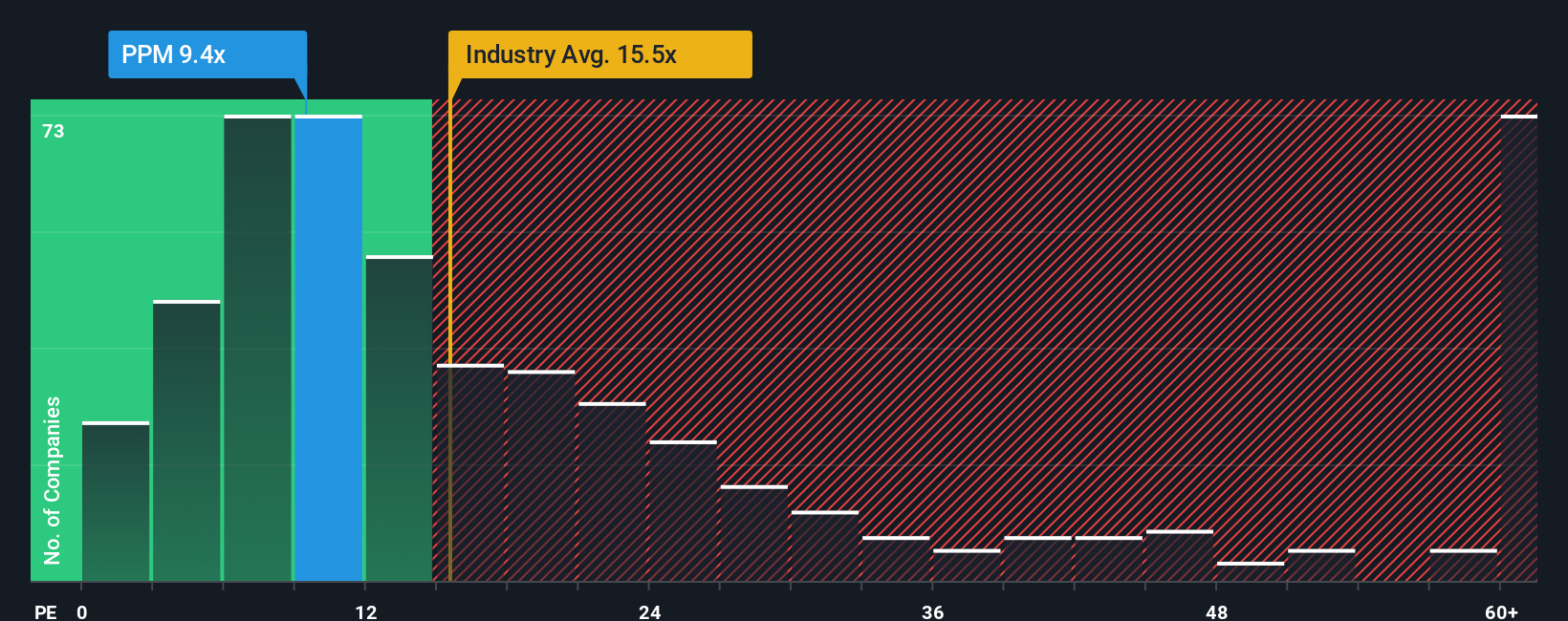- Australia
- /
- Diversified Financial
- /
- ASX:PPM
Pepper Money Limited's (ASX:PPM) Earnings Are Not Doing Enough For Some Investors
With a price-to-earnings (or "P/E") ratio of 9.4x Pepper Money Limited (ASX:PPM) may be sending bullish signals at the moment, given that almost half of all companies in Australia have P/E ratios greater than 19x and even P/E's higher than 37x are not unusual. However, the P/E might be low for a reason and it requires further investigation to determine if it's justified.
While the market has experienced earnings growth lately, Pepper Money's earnings have gone into reverse gear, which is not great. The P/E is probably low because investors think this poor earnings performance isn't going to get any better. If you still like the company, you'd be hoping this isn't the case so that you could potentially pick up some stock while it's out of favour.
See our latest analysis for Pepper Money

Is There Any Growth For Pepper Money?
Pepper Money's P/E ratio would be typical for a company that's only expected to deliver limited growth, and importantly, perform worse than the market.
Retrospectively, the last year delivered a frustrating 11% decrease to the company's bottom line. This means it has also seen a slide in earnings over the longer-term as EPS is down 39% in total over the last three years. Accordingly, shareholders would have felt downbeat about the medium-term rates of earnings growth.
Shifting to the future, estimates from the four analysts covering the company suggest earnings should grow by 4.6% per year over the next three years. That's shaping up to be materially lower than the 15% per year growth forecast for the broader market.
With this information, we can see why Pepper Money is trading at a P/E lower than the market. It seems most investors are expecting to see limited future growth and are only willing to pay a reduced amount for the stock.
The Key Takeaway
Using the price-to-earnings ratio alone to determine if you should sell your stock isn't sensible, however it can be a practical guide to the company's future prospects.
We've established that Pepper Money maintains its low P/E on the weakness of its forecast growth being lower than the wider market, as expected. At this stage investors feel the potential for an improvement in earnings isn't great enough to justify a higher P/E ratio. Unless these conditions improve, they will continue to form a barrier for the share price around these levels.
There are also other vital risk factors to consider and we've discovered 2 warning signs for Pepper Money (1 is a bit unpleasant!) that you should be aware of before investing here.
Of course, you might find a fantastic investment by looking at a few good candidates. So take a peek at this free list of companies with a strong growth track record, trading on a low P/E.
New: Manage All Your Stock Portfolios in One Place
We've created the ultimate portfolio companion for stock investors, and it's free.
• Connect an unlimited number of Portfolios and see your total in one currency
• Be alerted to new Warning Signs or Risks via email or mobile
• Track the Fair Value of your stocks
Have feedback on this article? Concerned about the content? Get in touch with us directly. Alternatively, email editorial-team (at) simplywallst.com.
This article by Simply Wall St is general in nature. We provide commentary based on historical data and analyst forecasts only using an unbiased methodology and our articles are not intended to be financial advice. It does not constitute a recommendation to buy or sell any stock, and does not take account of your objectives, or your financial situation. We aim to bring you long-term focused analysis driven by fundamental data. Note that our analysis may not factor in the latest price-sensitive company announcements or qualitative material. Simply Wall St has no position in any stocks mentioned.
About ASX:PPM
Pepper Money
Operates as a non-bank lender in the mortgage and asset finance markets in Australia and New Zealand.
Undervalued average dividend payer.
Similar Companies
Market Insights
Community Narratives




